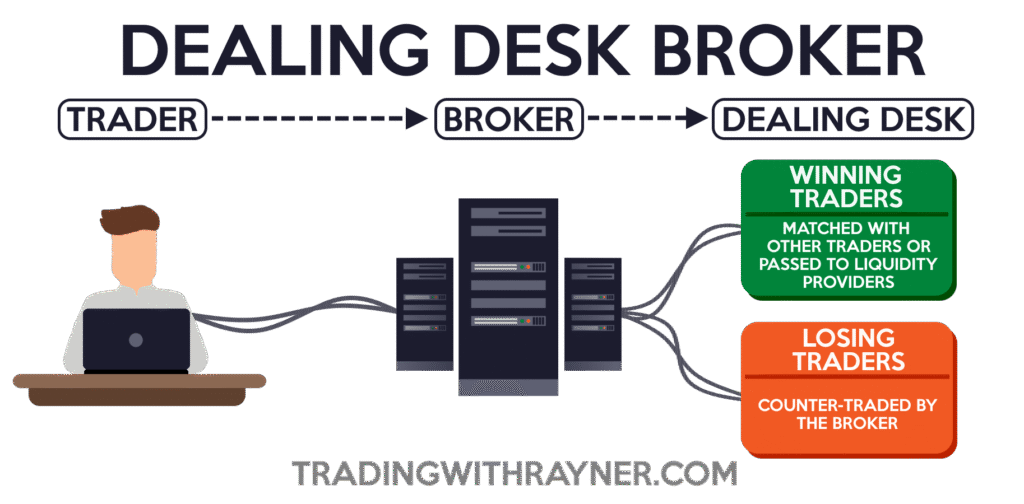
One of the first decisions every forex trader has to make is choosing the right broker.
ICT (Inner Circle Trader) emphasizes that your broker plays a huge role in how effectively you can trade, especially when it comes to execution, spreads, and transparency.
The two main types of brokers you’ll come across are:
- Dealing Desk Brokers (DD)
- Non-Dealing Desk Brokers (NDD)
Let’s break down the differences in simple terms so you can decide which works best for your trading journey.
1. What is a Dealing Desk Broker (DD)?

A Dealing Desk Broker is also called a Market Maker.
- They create their own market for traders.
- When you place a buy order, they may take the opposite sell order themselves instead of sending it to the larger interbank market.
- In other words, they can profit when you lose.
1. Example:
You buy EUR/USD at 1.1000 with a dealing desk broker.
- If the market goes up, they may hedge your order with other liquidity providers.
- If the market goes down, they could keep the profit since you lost the trade.
ICT notes that many retail traders are attracted to dealing desk brokers because they offer:
- Fixed spreads
- Lower minimum deposits
- Easy account setups
But there’s a catch: conflict of interest.
Since they take the other side of your trade, your loss can be their gain.
2. What is a Non-Dealing Desk Broker (NDD)?

A Non-Dealing Desk Broker does not take the other side of your trade.
Instead, they act as a bridge between you and liquidity providers like banks, hedge funds, or other traders.
There are two types of NDD brokers:
- STP (Straight Through Processing) – Your orders go directly to liquidity providers.
- ECN (Electronic Communication Network) – You trade in a network where other participants (banks, funds, traders) provide liquidity.
1. Example:
You buy EUR/USD at 1.1000 with an ECN broker.
- The broker sends your order into the network.
- Another participant sells to you at that price.
- The broker earns a small commission instead of trading against you.
ICT highlights that NDD brokers usually:
- Offer variable spreads
- Charge commissions
- Provide more transparency and faster execution
3. ICT’s View on Broker Choice for Trading Forex
ICT emphasizes that serious traders should understand how brokers make money.
With Dealing Desk Brokers, the spread may look attractive, but the conflict of interest can work against you.
Slippage and stop-hunting can also occur.
With Non-Dealing Desk Brokers, execution is closer to the true interbank market, making them better suited for ICT concepts like precision entries, stop placement, and trading around liquidity pools.
4. Which One Should You Choose?
- If you are a beginner – A Dealing Desk broker may seem appealing because of the low cost and simple structure. But be cautious of manipulation.
- If you are serious about ICT trading – A Non-Dealing Desk broker (especially ECN) is recommended. You’ll get raw spreads, better transparency, and more accurate price action.
5. Example Scenario of Dealing Desk vs Non-Dealing Desk (ICT Perspective)

Imagine you are trading GBP/USD during London session using ICT concepts:
- With a Dealing Desk broker: Spread is fixed at 2 pips. Your stop-loss might get triggered more easily because of artificial widening during volatile times.
- With an NDD broker: Spread can drop to 0.2 pips during liquid hours, which allows you to place tighter stops and execute trades more precisely.
This small difference can make or break your trade when following ICT’s strategies that depend on precise market entries.
6. Conclusion
Choosing the right broker is not just about spreads and commissions.
It’s about trust, transparency, and alignment with how you want to trade.
- Dealing Desk Brokers: Easier entry but possible conflicts of interest.
- Non-Dealing Desk Brokers: Transparent, faster execution, better for ICT-style trading.
If your goal is to grow as a professional trader using ICT concepts, then a Non-Dealing Desk (ECN/STP) broker is the smarter choice.

Leave a Reply